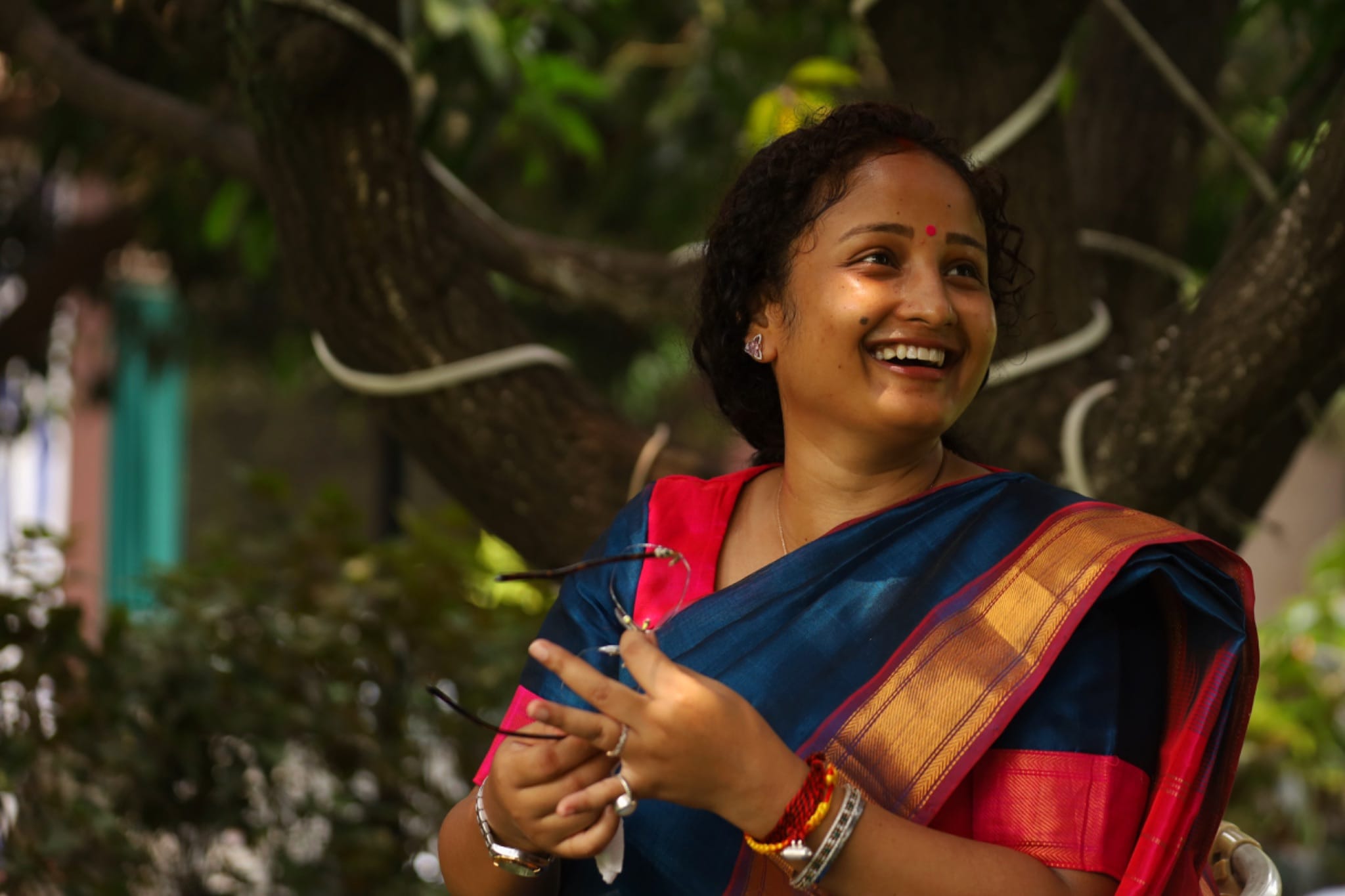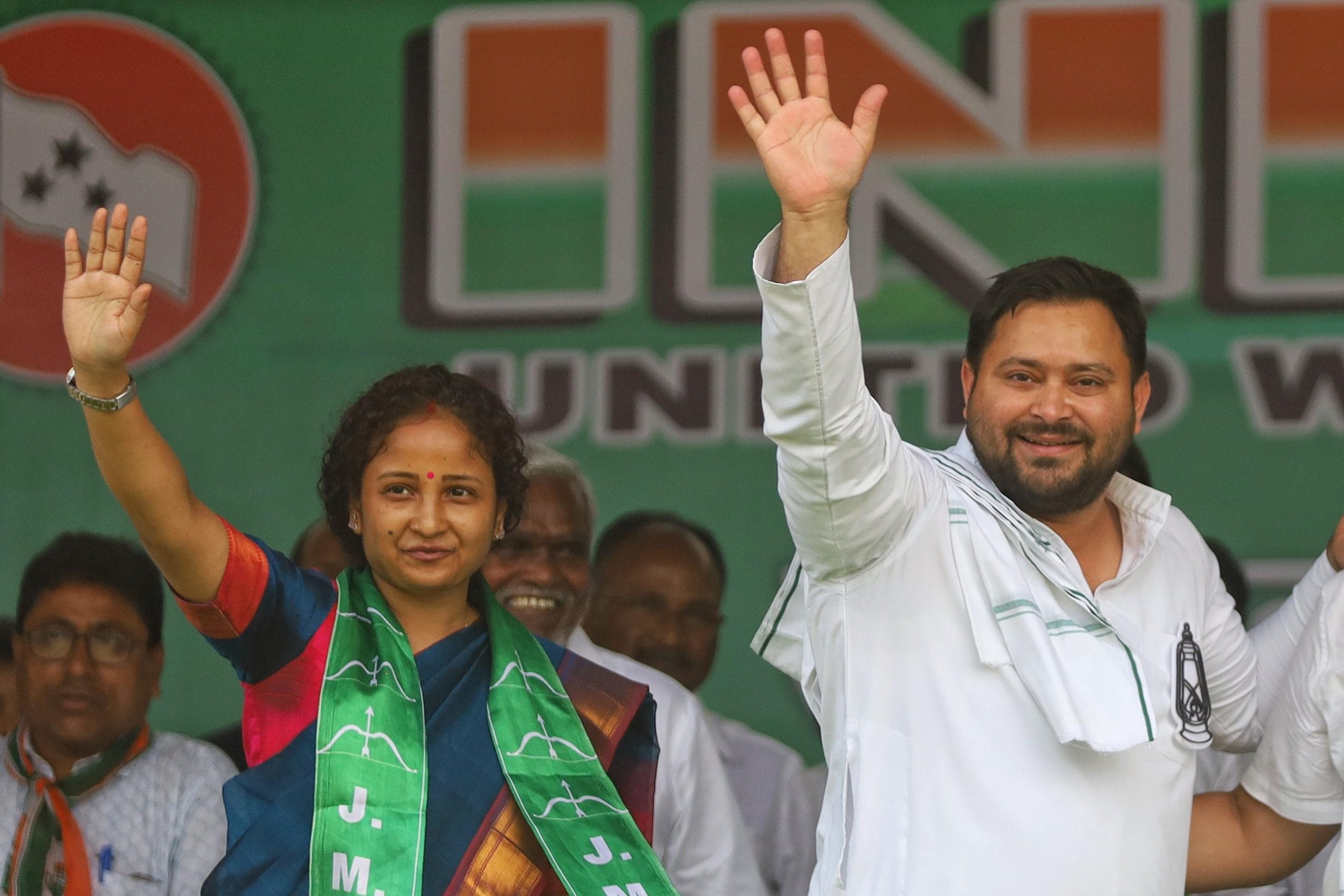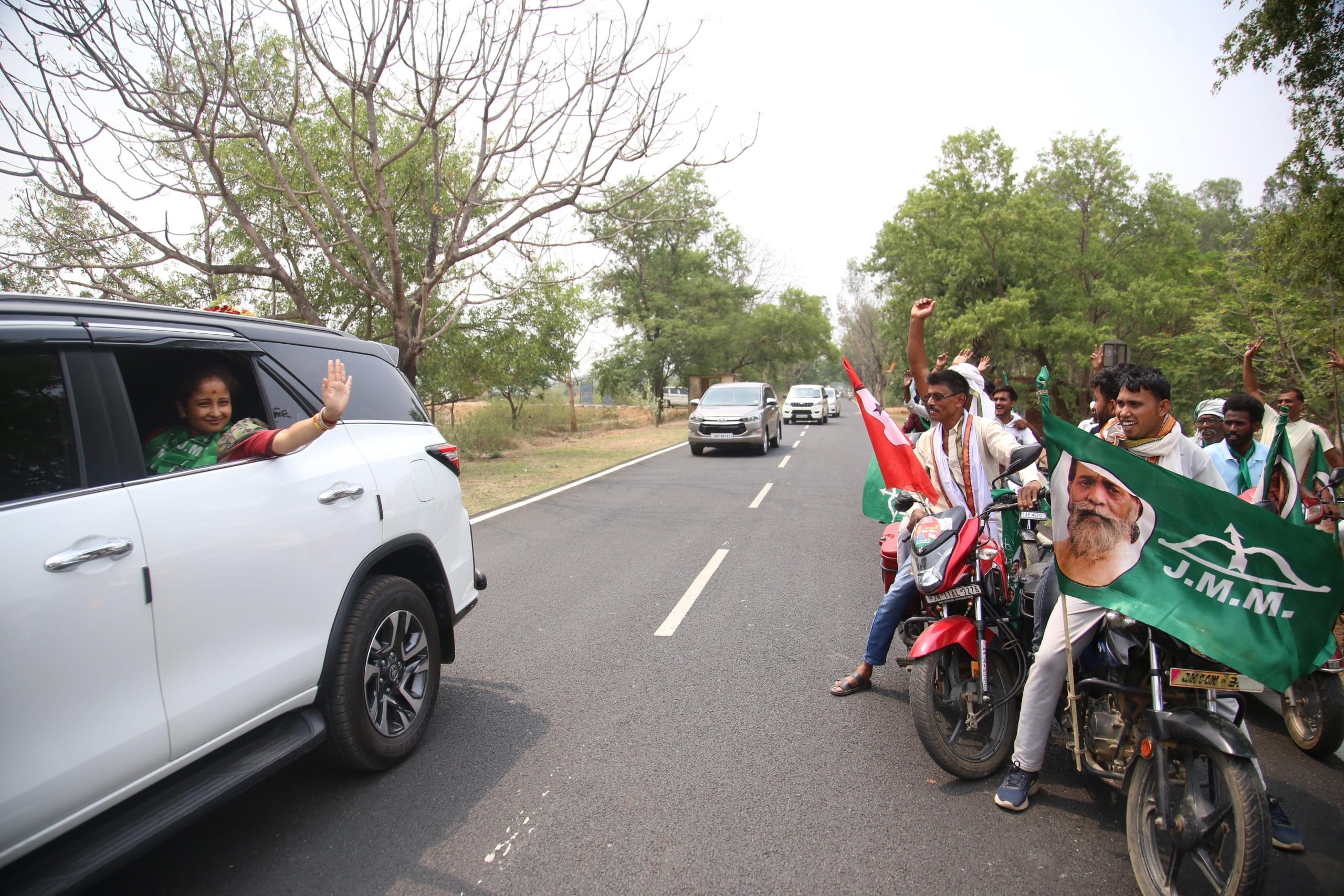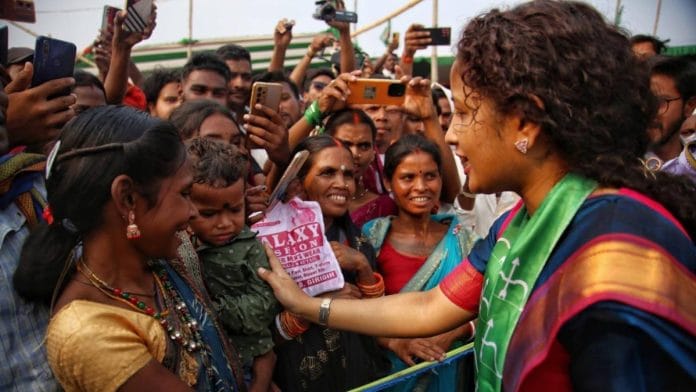Gandey (Jharkhand): “Tell me which date, which date is that. Raise both your hands and tell me which date,” Kalpana Murmu Soren roars to the crowd around her. And the people of Ghatkul village in Jharkhand’s Giridih district shout back: “Bees tareekh, bees tareekh, bees tareekh.” They know the date: 20 May.
The loving mother, the grieving wife, the wronged woman, and now the angry leader—Kalpana Soren has stepped into the limelight in a red sindoor, bindi, two bangles alongside her sons. They serve as a constant reminder of what’s at stake.
She fists the air, galvanises the crowd with her live-wire energy, and takes selfies with women and children.
May 20 is when voting in Jharkhand will be held in three seats—Chatra, Hazaribagh, and Koderma—in the fifth phase of the 2024 Lok Sabha elections. And with her husband, former Jharkhand Chief Minister Hemant Soren, in jail since January in an alleged money laundering case, she’s become the face of the party, Jharkhand Mukti Morcha (JMM). Kalpana is also the JMM’s candidate for the bypoll on Gandey assembly constituency, which fell vacant after the resignation of MLA Sarfaraz Ahmad, who moved to the Rajya Sabha. Voting in Gandey will also take place on 20 May.
Like a politician born to the role, Kalpana Soren doesn’t spare any punches. She has accused the Narendra Modi-led central government of abusing its power and harassing opposition parties. She drums up support for her jailed husband—he is a “victim of politics”.
But these days, as the elections roll towards their conclusion, her anger is tempered with a need to be seen by everyone. Women and men stand on tiptoes, crane their necks, climb trees, and clamber onto motorcycles and chairs to catch a glimpse of the woman in a blue sari–their new tribal leader.

“You have to exercise your right to vote to save yourself. Remember your Dada, your former CM, the person who ruled all hearts? He is in jail today. You people have to give an answer to this by voting. Iska jawab kaise dijiyega?” Soren asks the crowd how they will respond.
“Vote ke chot se,” is the resounding reply—‘by the blow of vote’.

Bow and arrow
Kalpana Soren is always surrounded by men—party workers, security personnel and aides—but it’s the women she reaches out to. She pauses to greet their children, take selfies, and shake hands.
She gets onto the stage at Ghatkul village surrounded by 20 men, but immediately turns to the five women standing in line to greet her with orange marigold garlands. It’s her fourth rally in Gandey assembly segment, which falls in the Koderma Lok Sabha constituency. Soren filed her nomination on 30 April.

If there’s any discomfort in taking on such a public and demanding role, Soren does not show it. She knows better. She describes this new political calling as “sarvajanik (public) life”. Her time now belongs to the party.
Her priority is to be seen. And in the fag end of the election season, she’s roped in her children as well—Nitil, 15, and Biswajit, 12.


“Abhi in dono ki summer vacations hai, toh inko main apne sath nukad sabha mein lekar ayi hu (currently, their summer vacations are on, which is why I have brought them with me to the street gathering).” Soren says while addressing the crowd. She makes sure that both the boys are on stage, while she addresses the crowd. A silent but powerful reminder of the family’s legacy.
“Hemant ji ne Covid mein itna kuch kia apke lie, humare lie (Hemant did so much for you, for us, during Covid),” she shouts in the mic at the top of her voice. She does not stutter or stumble—an orator in making.
For party members, she is the bow and the arrow, the JMM’s election symbol. And she has transformed herself into an arsenal for the party and her family.
The radical change in the life of the MTech and MBA degree holder—from being the wife of the chief minister to a leader in her own right—has upended family life in the Soren household. This is the first time that Kalpana Soren isn’t spending the summer vacation with her kids. Rallies, public speeches, and cameras have replaced family time, yoga, and music.
The presence of my political advisors and party workers has a positive impact. It energises me because they are guiding me in this new journey that I started. I feel very safe; they are the backbone. They have made me comfortable and I really admire their support
A busy schedule
On a Tuesday morning, the second day of her campaign in Gandey constituency, Kalpana Soren steps out in a cotton blue-pink saree, surrounded by five male security personnel.
The women of the Soren family have rallied around her. One member always travels with her, providing water and snacks.
But before she hits the trail, she meets and greets the swarm of journalists queuing up for interviews. The curiosity about Soren means that the reporters and camera crew are never too far away.


She steps out of the hotel with her aides, walks down the green grass lawn with folded hands, and greets every media person with a smile. Interviews have been lined up with a television channel and then with a digital media organisation. One reporter suggests they do the interview under the sun on the lawn.
“Madam na bahut frank and humble hai,” says a local journalist, who has travelled from Ranchi to interview her. She mics up and holds forth for 40 minutes under the hot Jharkhand sun.
When it is completed, she walks to the nearest chair placed under the shade of a tree. “Humko itna pasina aa raha hai, aap logon ko nahi ho raha hai kya,” she asks the media persons how they are handling the heat as she wipes the sweat from her brow.

Soren looks at her team as she finishes the last interview. “Arey Tejashwi ji kab tak pahunch rahe hain, hum log ko late ho jayega.” Apparently, RJD leader Tejashwi Yadav is scheduled to come and Kalpana Soren doesn’t want to be late.
But the reporters aren’t done with her yet. The interviews carry in the car—a rapid fire round. All the questions are about her life as a new politician and how she manages her family duties as well. “How has it changed? Is your personal life affected?” After this, she has to attend a public gathering with Tejashwi Yadav, Chief Minister Champai Soren, and several leaders from Jharkhand.
Her convoy has almost 10 vehicles. “Chaliye chaliye,” she instructs others to make a move. She does not want to be late.

‘A family of 3.5 crore’
In the run-up to the voting day, there’s a desperate urgency to cover every corner of Gandey. For many, she’s an unknown entity. During her first visit to the constituency a month and a half ago, she met around 800 JMM workers who helped her map the roads and dirty paths to underdeveloped villages. She’s deliberately chosen places that are not party strongholds.
“Ma’am ka hai ki ek hum kisi ek particular community ko represent nahi karenge. She does not want to be the leader of only Muslims and Tribals. She believes that she will be a real representative when she gets votes from every pocket,” said Sunil Srivastav, a close aide of the Soren family.
Kalpana Soren is surrounded by men who have been with Hemant Soren and his father Shibhu Soren, the president of JMM. She walks with them, listens to their political advice, and then makes her own plans.
“The presence of my political advisors and party workers has a positive impact. It energises me because they are guiding me in this new journey that I started. I feel very safe; they are the backbone. They have made me comfortable and I really admire their support,” she says.
The first destination is the public gathering at Bengabad village in Giridih district, where she shares the seat with CM Champai Soren and Tejashwi Yadav, among others. She sits in the front row, standing out in her brightn-coloured saree surrounded by men clad in colourless kurtas and shirts. She greets every leader with folded hands and a bright smile. And she waits for her turn to address the people of Gandey.


“Aasar do okaya (whose bow-arrow is it?),” she asks the crowd, referring to the JMM symbol. The enthusiastic gathering would reply in unison: “Abua (ours)”.
She gets off the stage, walks to the crowd, and meets the women who want to shake hands with their leaders.
“Isko khana khilaya hai ki nahi (has this child been fed)?” she enquires of a mother standing in the crowd with a toddler. She cuddles the tearful toddler, pulling his cheeks and playing with him to placate him, as the mother looked on with love and admiration.
“My family has extended from four members to 3.5 crore people of Gandey. I have received a lot of love and support,” Kalpana Soren tells ThePrint.

‘Multi-lingual, down-to-earth’
Kalpana Soren moves around in a black and white SUV with black tinted windows that allows her a small measure of privacy. She checks her phone but is distracted by the women surrounding the car. Some walk along, trying to keep pace; others peep inside. Soren extends both her arms to the crowd, waving back at them. “Vote, vote for JMM,” she urges them before the car picks up speed.
Once the windows are rolled up, she checks her phone, munches on some food. The car is stocked with sweet buns, sattu, fruits, and ORS—supplements to survive the scorching heat in the Chota Nagpur plateau.
But she’s compelled to cede her privacy, roll down the windows, and wave to the crowds. She wants to be seen.


Along the way, she attends small street gatherings organised by village party workers. She stops on the road to meet women waiting with marigold garlands. Kalpana Soren has attended around 31 such gatherings in a day.
The Soren family’s political aides describe her as “down to earth”.
“We will vote for Kalpana, not only because she is the daughter-in-law of Guruji (Shibu Soren), but she has also become a part of us,” says Doloni Murmu, one of the voters in Jodhpur village of Gandey constituency.
The villages change, but the message remains the same—vote for JMM. She switches from Hindi to Odia, then Santhali. She is also fluent in Bengali and English. “Namaskar” for the Hindi-speaking supporters, “Johar” for the Santhals, and “As-Salaam-Alaikum” for Muslims.

‘Let’s go, ma’am has come’
Kalpana Soren’s SUV makes its way through the narrowest alleys of Ghatkul village. It’s night, but people are waiting patiently for her.
Her day was full of traversing from one village to another, urging and requesting people to vote for JMM.
Women in the locality, guided by the headlight of the car, start moving toward it.

“Aao na, madam aayi hain (let’s go, ma’am has come),” says a woman to her friends, who were hiding behind the walls of their house.
It’s around 10 pm when Soren steps out of the car with a smile. A small stage had been set for her, with one tube light, garlands, and a few water bottles. It’s dark, but for the white light throwing shadows on her face.

Women standing in the crowd talk among themselves. “Ek selfie toh hona hi chahiye (We must get a selfie).” The message is somehow delivered to Soren. She immediately directs her security to make some space, stands with the women, and asks the photographers to take a picture.
The women stand together and raise their hands to make the ‘V’ sign.

(Edited by Prashant)






